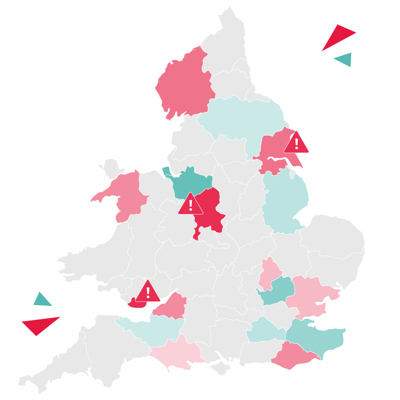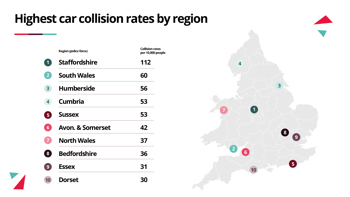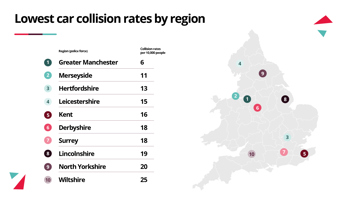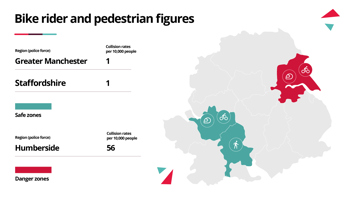UK’s Road Traffic Collision Hotspots Revealed: What Law Firms Need to Know to Prepare for PI Case Surges
Autumn is here – and darker nights and bad weather can make it a notorious time for road traffic collisions (RTCs). Figures from the AA suggest that crashes rise by around 11% in the fortnight after the clocks go back compared to the previous fortnight.
Personal injury solicitors are among those who see how the victims of RTCs are impacted, especially when these claims account for a large proportion of their caseloads. The government’s Compensation Recovery Unit gives us an idea of how much motoring dominates the personal injury landscape. In 2023/24, 312,283 motoring injury claims were registered, compared to 64,423 in public places, 43,926 in the workplace and 16,395 due to clinical negligence.

How common are collisions in the UK?
There were 128,920 road casualties in 2024, a 4% decline on the previous year. The UK also has the third lowest fatality rate in Europe, according to the road safety charity Brake.
However, there may be regional differences in the prevalence and type of RTCs – which could inform law firms’ business decisions. To get a better understanding of these variations, we asked 21 police forces in England and Wales, via Freedom of Information (FOI) requests, how many incidents had been reported in 2024.
Worst parts of the UK for car crashes
Our research reveals disproportionately high numbers of incidents in some parts of the UK compared to others.
Staffordshire came top by a long way with 112 collisions per 10,000 people in 2024, followed by South Wales (60) and Humberside (56). In contrast, Greater Manchester saw the fewest collisions last year at six per 10,000 people, then Merseyside at 11 and Hertfordshire at 13.
Highest car collision rates in 2024 by police force

Lowest car collision rates in 2024 by police force

How safe are bike riders and pedestrians?
Our data also revealed the most and least dangerous areas for those classed as vulnerable road users.
Humberside appears the most dangerous region for motorcyclists/cyclists and pedestrians – with 56 collisions recorded for each in 2024. At the other end of the scale, Greater Manchester looks to be safest for motorcyclists/cyclists while Staffordshire seems to be safest for pedestrians, with both regions reporting one collision each.

Changes in collision figures
Of course, collision numbers are constantly changing all the time – dedicated road safety campaigns and police patrols can reduce incidents, while other areas may see a jump due to local factors such as poor road conditions and weather events.
As well as looking at the prevalence of collisions we looked at which regions had seen the biggest changes in 2023/24. Of the 21 regions analysed, just four reported an increase – all the others saw a drop.
Biggest increase in collisions involving a car 2023/24
Region (police force) |
Percentage increase (2023-24) |
|
Cumbria |
16% |
|
Avon and Somerset |
2% |
|
Essex |
0.6% |
|
North Yorkshire |
0.08% |
Biggest drop in collisions involving a car 2023/4
|
Region (police force) |
Percentage increase (2023-24) |
|
North Wales |
-34% |
|
Greater Manchester |
-30% |
|
Kent |
-24% |
|
Cleveland |
-15% |
|
Surrey |
-13% |
|
Merseyside |
-11% |
|
Derbyshire |
-10% |
|
South Wales |
-8% |
|
Wiltshire |
-7% |
|
Sussex |
-5% |
View from law firms
While these figures highlight the regional differences in road traffic accidents, they also carry real implications for legal professionals, especially those handling personal injury claims. We spoke to Sucheet Amin, a senior partner at Aequitas Legal in Manchester and a personal injury solicitor since 2001, and founder of InCase to find out what it means for law firms.
He said:
“Law firms may see fluctuations in PI cases relating to RTCs – especially during the autumn and winter months when poor weather conditions can lead to a rise in compensation claims.”
“Being able to manage these cases efficiently is key but what’s also critical is how you communicate with clients, to avoid causing them any additional distress. Allowing them to provide information quickly and securely online, and receive regular updates on how their case is progressing can alleviate some of that distress, and hopefully lead to a faster resolution.”
His comments were echoed by Clare Bonsall, Head of Product at Access Legal.
“Personal injury claims, by their nature, are often traumatic for the victim – and they need a resolution as quickly as possible,” she said.
Solicitors must therefore have the workflows and technology in place to streamline this process and secure the best outcome. A client portal is a really convenient way to request information and share updates, both for the client and the solicitor.
Legal technology, including AI-powered case management software, doesn’t only improve day-to-day processes, it can also provide insights that improve decision making at a department and firm level. These insights could help you to identify emerging trends – for example, there has been a notable rise in collisions involving e-scooters which could be reflected in your caseload. Both internal and external data play an important role in law firms’ commercial decisions – including tailoring their service and advertising to clients’ needs.”

Find out how our legal software can benefit your firm
Common consumer questions, reviewed by a personal injury solicitor
Do I need a solicitor to make a personal injury claim?
You can make a direct personal injury claim via Official Injury Claim – a free and independent service developed by the MIB (Motor Insurers Bureau) on behalf of the Ministry of Justice.
However, there are a number of stipulations. Claims cover minor injuries, with a compensation claim of less than £5,000. You must also have been in the car at the time.
Other claims don’t legally require a solicitor but it is strongly advised. The Law Society says that a solicitor will present your case expertly and ensure you submit the right medical evidence – all factors that can speed up resolution times and get fair compensation.
Can I make a personal injury claim if I was involved in a collision abroad?
Claiming compensation for a personal injury that happened abroad is more complex but it is certainly possible. Citizen Advice Bureau (CAB) recommends seeking legal advice because you’ll need support tracking down the perpetrator and/or witnesses and navigating another legal system. You’ll need to work with local police, your insurers and possibly the embassy to ensure all details are recorded at the time.
Can I make a personal injury claim if I wasn’t involved in a collision but saw it happen?
There are certain circumstances where you could claim compensation if you suffered a recognised psychological injury having seen the event happen and its aftermath. This could be: you know a person who was involved in an accident; you were physically close to the accident scene or you had a close connection to someone actually involved, such as you’re their partner or family member.
Can I make a personal injury claim if I was involved in a near miss?
Yes. You could claim compensation if you were walking along a pavement and the driver of a car lost control and mounted the kerb only to narrowly miss you, and you genuinely feared for your safety and suffered a recognised psychological injury.
How severe does an injury have to be to make a personal injury claim?
There’s no threshold for injury severity or whether it was temporary or permanent. It also includes both physical and psychological harm. However, there are a number of factors that determine whether or not you can pursue a claim – in most cases, you must bring it to court within three years and be able to prove that someone was at fault.
Are personal injury claims a civil or criminal matter?
Personal injury claims are a civil matter – so you need to prove someone is liable ‘on the balance of probabilities’. However, RTCs can also involve criminal negligence, usually when a driver has behaved extremely recklessly. As with all criminal cases, a court must prove ‘beyond reasonable doubt’ that the driver is guilty – but regardless of the verdict, you can still pursue a personal injury case.
Can I make a personal injury claim if I was a passenger in the car?
You can claim whether the driver of the car or another driver was at fault. In some cases, that might be a family member, friend or colleague. Legally, it doesn’t matter what relationship you have with them – you can still make a claim.
How much compensation can I expect to receive?
Compensations can range from a few hundred pounds for minor injuries to millions of pounds for ones that are life-changing and where the person requires significant, often life-long, care. There is no upper limit to compensation claims either. Last year, Stewarts secured nearly £42 million for a child who was involved in a RTC while walking on the pavement, resulting in a life-changing brain injury.

 AU & NZ
AU & NZ
 SG
SG
 MY
MY
 US
US
 IE
IE


